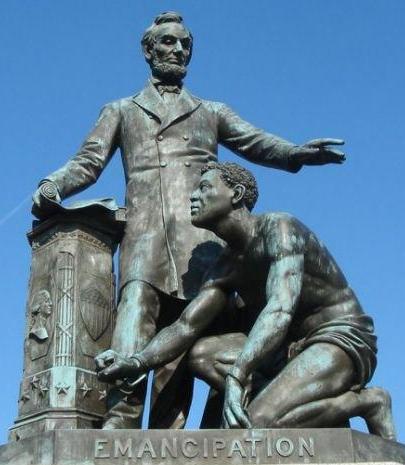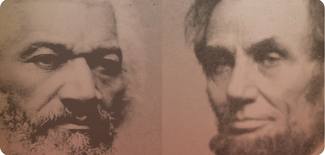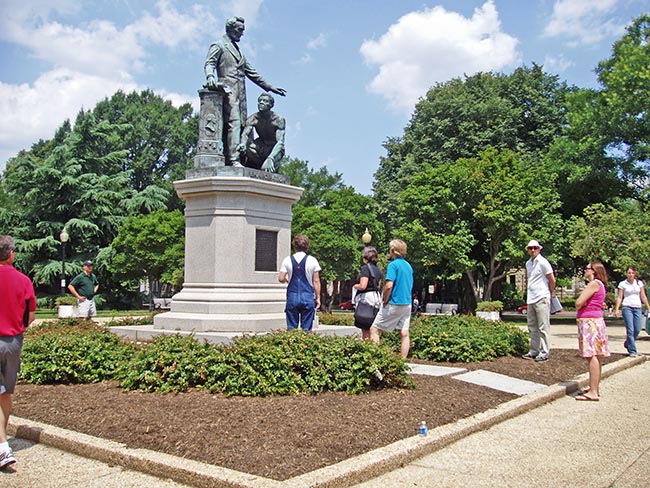|
|
Online Texts for Craig White's Literature Courses
|
|
|
Frederick Douglass selections from Oration in Memory of Abraham Lincoln Delivered April 14, 1876 at the Unveiling of The Freedmenís Monument in Memory of
Abraham
|
Freedmen's Monument , a.k.a. the Emancipation Memorial |
[1] . . . Fellow-citizens, in what we have said and done
today, and in what we may say and do hereafter, we disclaim everything like
arrogance and assumption. We claim for ourselves no superior devotion to the
character, history, and memory of the illustrious name whose monument we have
here dedicated today. We fully comprehend the relation of Abraham Lincoln both
to ourselves and to the white people of the
[2] He was preeminently the white manís President, entirely devoted to the welfare of white men. He was ready and willing at any time during the first years of his administration to deny, postpone, and sacrifice the rights of humanity in the colored people to promote the welfare of the white people of this country. In all his education and feeling he was an American of the Americans. He came into the Presidential chair upon one principle alone, namely, opposition to the extension of slavery. His arguments in furtherance of this policy had their motive and mainspring in his patriotic devotion to the interests of his own race. [Lincoln's new Republican party had absorbed the pre-existing Free Soil Party, which was not Abolitionist but opposed the expansion of slavery because of the economic threat it posed to white farmers and businessmen.]
[3] To protect, defend, and perpetuate slavery in the states where it existed Abraham Lincoln was not less ready than any other President to draw the sword of the nation. He was ready to execute all the supposed guarantees of the United States Constitution in favor of the slave system anywhere inside the slave states. He was willing to pursue, recapture, and send back the fugitive slave to his master [i.e., the Fugitive Slave Act of 1850], and to suppress a slave rising for liberty, though his guilty master were already in arms against the Government. The race to which we belong were not the special objects of his consideration.
[4] Knowing this, I concede to you, my white fellow-citizens, a pre-eminence in this worship at once full and supreme. First, midst, and last, you and yours were the objects of his deepest affection and his most earnest solicitude. You are the children of Abraham Lincoln. We are at best only his step-children; children by adoption, children by forces of circumstances and necessity. To you it especially belongs to sound his praises, to preserve and perpetuate his memory, to multiply his statues, to hang his pictures high upon your walls, and commend his example, for to you he was a great and glorious friend and benefactor. Instead of supplanting you at his altar, we would exhort you to build high his monuments; let them be of the most costly material, of the most cunning workmanship; let their forms be symmetrical, beautiful, and perfect, let their bases be upon solid rocks, and their summits lean against the unchanging blue, overhanging sky, and let them endure forever! But while in the abundance of your wealth, and in the fullness of your just and patriotic devotion, you do all this, we entreat you to despise not the humble offering we this day unveil to view; for while Abraham Lincoln saved for you a country, he delivered us from a bondage, according to Jefferson, one hour of which was worse than ages of the oppression your fathers rose in rebellion to oppose. [reference to metaphorical "slavery" of American colonies under English "tyranny"]
[5] Fellow-citizens, ours is no new-born zeal and devotion--merely a thing of this moment. The name of Abraham Lincoln was near and dear to our hearts in the darkest and most perilous hours of the Republic. We were no more ashamed of him when shrouded in clouds of darkness, of doubt, and defeat than when we saw him crowned with victory, honor, and glory. Our faith in him was often taxed and strained to the uttermost, but it never failed. When he tarried long in the mountain; when he strangely told us that we were the cause of the war; when he still more strangely told us that we were to leave the land in which we were born; when he refused to employ our arms in defense of the Union; when, after accepting our services as colored soldiers, he refused to retaliate our murder and torture as colored prisoners; when he told us he would save the Union if he could with slavery; when he revoked the Proclamation of Emancipation of General Fremont; when he refused to remove the popular commander of the Army of the Potomac, in the days of its inaction and defeat, who was more zealous in his efforts to protect slavery than to suppress rebellion; when we saw all this, and more, we were at times grieved, stunned, and greatly bewildered; but our hearts believed while they ached and bled.
[6] Nor was this, even at that time, a blind and unreasoning superstition. Despite the mist and haze that surrounded him; despite the tumult, the hurry, and confusion of the hour, we were able to take a comprehensive view of Abraham Lincoln, and to make reasonable allowance for the circumstances of his position. We saw him, measured him, and estimated him; not by stray utterances to injudicious and tedious delegations, who often tried his patience; not by isolated facts torn from their connection; not by any partial and imperfect glimpses, caught at inopportune moments; but by a broad survey, in the light of the stern logic of great events, and in view of that divinity which shapes our ends, rough hew them how we will, we came to the conclusion that the hour and the man of our redemption had somehow met in the person of Abraham Lincoln. It mattered little to us what language he might employ on special occasions; it mattered little to us, when we fully knew him, whether he was swift or slow in his movements; it was enough for us that Abraham Lincoln was at the head of a great movement, and was in living and earnest sympathy with that movement, which, in the nature of things, must go on until slavery should be utterly and forever abolished in the United States. . . .
[7] I have said that President Lincoln was a white man, and shared the prejudices common to his countrymen towards the colored race. Looking back to his times and to the condition of his country, we are compelled to admit that this unfriendly feeling on his part may be safely set down as one element of his wonderful success in organizing the loyal American people for the tremendous conflict before them, and bringing them safely through that conflict. His great mission was to accomplish two things: first, to save his country from dismemberment and ruin; and, second, to free his country from the great crime of slavery. . . .
[8] Though Mr. Lincoln shared the prejudices of his white fellow-countrymen against the Negro, it is hardly necessary to say that in his heart of hearts he loathed and hated slavery. . . .
[9] Few great public men have ever been the victims of fiercer denunciation than Abraham Lincoln was during his administration. He was often wounded in the house of his friends. Reproaches came thick and fast upon him from within and from without, and from opposite quarters. He was assailed by Abolitionists; he was assailed by slave-holders; he was assailed by the men who were for peace at any price; he was assailed by those who were for a more vigorous prosecution of the war; he was assailed for not making the war an abolition war; and he was bitterly assailed for making the war an abolition war.
[10] But now behold the change: the judgment of the present hour is, that taking him for all in all, measuring the tremendous magnitude of the work before him, considering the necessary means to ends, and surveying the end from the beginning, infinite wisdom has seldom sent any man into the world better fitted for his mission than Abraham Lincoln. His birth, his training, and his natural endowments, both mental and physical, were strongly in his favor. Born and reared among the lowly, a stranger to wealth and luxury, compelled to grapple single-handed with the flintiest hardships of life, from tender youth to sturdy manhood, he grew strong in the manly and heroic qualities demanded by the great mission to which he was called by the votes of his countrymen. The hard condition of his early life, which would have depressed and broken down weaker men, only gave greater life, vigor, and buoyancy to the heroic spirit of Abraham Lincoln. He was ready for any kind and any quality of work. . . .
[11] Fellow-citizens, the fourteenth day of April, 1865, of which this is the eleventh anniversary, is now and will ever remain a memorable day in the annals of this Republic. It was on the evening of this day, while a fierce and sanguinary rebellion was in the last stages of its desolating power; while its armies were broken and scattered before the invincible armies of Grant and Sherman; while a great nation, torn and rent by war, was already beginning to raise to the skies loud anthems of joy at the dawn of peace, it was startled, amazed, and overwhelmed by the crowning crime of slavery--the assassination of Abraham Lincoln. It was a new crime, a pure act of malice. No purpose of the rebellion was to be served by it. It was the simple gratification of a hell-black spirit of revenge. But it has done good after all. It has filled the country with a deeper abhorrence of slavery and a deeper love for the great liberator. . . .
![]()
![]()




